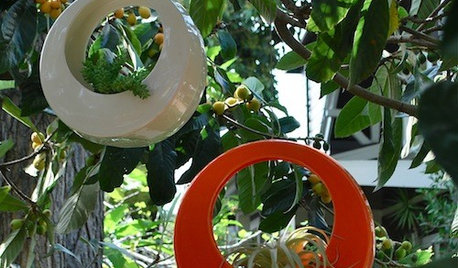Heirloom seeds & GMO's
User
10 years ago
Related Stories

GARDENING GUIDESSeeds or Seedlings? How to Get Your Garden Started
Growing delicious herbs and vegetables starts with knowing your goals and when you want to plant
Full Story
HOUZZ TOURSMy Houzz: A Stylish Brooklyn Apartment Filled With Memories
Collected pieces from travels, family heirlooms and contemporary finds turn an apartment into a home for 3
Full Story
HOUZZ TOURSMy Houzz: Sweetly Charming Ohio Family Cottage
This well-loved home exudes warmth with family heirlooms and hand-crafted furnishings, paired with a gorgeous backyard garden
Full Story
WINTER GARDENINGExtend Your Growing Season With a Cold Frame in the Garden
If the sun's shining, it might be time to sow seeds under glass to transplant or harvest
Full Story
EVENTSDesign Calendar: Feb. 10-Mar. 2, 2012
Whitney Biennial, Seattle Home Show, Chicago seed swap and more
Full Story0

NORTHWEST GARDENINGPacific Northwest Gardener's February Checklist
Let witch hazel cast its spell, shut off your mason bees' snooze button and hit up the nursery for seeds and roses
Full Story
REGIONAL GARDEN GUIDESNortheast Gardener's April Checklist
Revel in the wonders of spring by babying bulbs, sprinkling seeds for root crops and setting out some nibbles for the birds
Full Story
EDIBLE GARDENS8 Surefire Vegetables and Herbs for Beginning Gardeners
Learn the edible plants that are popular and easy to grow in a backyard or container garden
Full Story
GARDENING AND LANDSCAPING40 Great Gifts for Gardeners
What to Get for Green-Thumb Types. It's a No-Gnome Zone.
Full Story
GARDENING AND LANDSCAPINGDig This Garden Shed Makeover for Less Than $300
New paint, accessories and raised vegetable beds turn a drab outpost into a colorful charmer
Full Story





bluegoat_gw
don555
Related Professionals
South Orange Landscape Architects & Landscape Designers · Garden City Landscape Architects & Landscape Designers · Biloxi Landscape Contractors · Bristol Landscape Contractors · Elmhurst Landscape Contractors · Long Beach Landscape Contractors · Salmon Creek Landscape Contractors · Silver Firs Landscape Contractors · Marietta Window Contractors · Alexandria Window Contractors · Enumclaw Window Contractors · Estero Window Contractors · Oxnard Window Contractors · Palm River-Clair Mel Window Contractors · Tamalpais-Homestead Valley Window Contractorsnorthspruce
UserOriginal Author
northspruce
Konrad___far_north
don555
northspruce
UserOriginal Author
Konrad___far_north
Konrad___far_north
UserOriginal Author
nutsaboutflowers
don555
bluegoat_gw